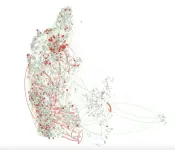(Press-News.org) A breakthrough for biomedical research promises new insight into immunotherapy development and disease modeling. Scientists at The University of Texas Health Science Center at San Antonio have created a humanized mouse model with a human immune system and a human-like gut microbiome that is capable of mounting specific antibody responses.
The scientists were led by Paolo Casali, MD, University of Texas Ashbel Smith Professor and Distinguished Research Professor, Department of Microbiology, Immunology and Molecular Genetics in the Joe R. and Teresa Lozano Long School of Medicine. Casali has five decades of biomedical research experience in immunology and microbiology and is a leading researcher in molecular genetics and epigenetics of the antibody response.
The aim of the multi-year project, which will appear in the August 2024 issue of Nature Immunology, was to overcome limitations of currently available in vivo human models by creating a humanized mouse with a fully developed and functional human immune system.
Mice are widely used in biological and biomedical research because they are small, easy to handle, share many immune elements and biological properties with humans and are easily genetically modified. Many of the more than the 1,600 immune response mouse genes, however, are incongruent with their human equivalents, resulting in divergencies or deficiencies of mice as predictors of human immune responses. This made availability of a “humanized” mouse model that faithfully reproduces human immune responses a high priority.
The first humanized mice were created in the 1980s to model human HIV infection and the human immune response to HIV. Humanized mice were, and have been created since, by injecting immunodeficient mice with human peripheral lymphocytes, hematopoietic stem cells or other human cells. Previous and current models, however, do not develop a fully functional human immune system, have a brief lifespan and do not mount efficient immune responses. This makes them unsuitable for development of in vivo human immunotherapies, human disease modeling or human vaccine development.
Casali’s team began with injecting immunodeficient NSG W41 mutant mice intracardiacally (left ventricle) with human stem cells they purified from umbilical cord blood. After a few weeks, once the graft has been established, the mice are hormonally conditioned with 17b-estradiol (E2), the most potent and abundant form of estrogen in the body. Hormonal conditioning by estrogen was prompted by previous research by Casali and others suggesting that estrogen boosts the survival of human stem cells, boosts B lymphocyte differentiation and production of antibodies to viruses and bacteria.
The resulting humanized mice, called TruHuX (for truly human, or THX), possess a fully developed and fully functional human immune system, including lymph nodes, germinal centers, thymus human epithelial cells, human T and B lymphocytes, memory B lymphocytes, and plasma cells making highly specific antibody and autoantibodies identical to those of humans.
THX mice mount mature neutralizing antibody responses to Salmonella Typhimurium and SARS-CoV-2 virus Spike S1 RBD after vaccination with Salmonella flagellin and the Pfizer COVID-19 mRNA vaccine, respectively. THX mice are also amenable to developing full-fledged systemic lupus autoimmunity after an injection of pristane, an oil that triggers an inflammatory response.
Casali said the THX mouse discovery opens the possibilities for human in vivo experimentation, for development of immunotherapeutics such as cancer checkpoint inhibitors, development of human bacterial and viral vaccines, as well as the modeling of many human diseases. He also hopes the new approach could make obsolete the use of non-human primates for immunological and microbiological biomedical research.
As prior research on the effect of estrogen and the immune system is sparse, Casali hopes this discovery prompts further research into the topic.
“By critically leveraging estrogen activity to support human stem cell and human immune cell differentiation and antibody responses, THX mice provide a platform for human immune system studies, development of human vaccines and testing of therapeutics,” Casali said.
With the THX model, the Casali lab is now investigating the in vivo human immune response to SARS-CoV-2 (COVID-19) at the systemic and local levels, and human memory B lymphocytes, the dependence on nuclear receptor RORα for their generation and the events that lead to RORα expression and dysregulation. They are also exploring epigenetic factors and mechanisms that mediate generation of human plasma cells, the cell factories that make antibodies — literally thousands per second — to bacteria, viruses or cancer cells.
_______________________________________________________________________
“A humanized mouse that mounts mature class-switched, hypermutated and neutralizing antibody responses”
Daniel P. Chupp, Carlos E. Rivera, Yulai Zhou, Yijiang Xu, Patrick S. Ramsey, Zhenming Xu, Hong Zan, Paolo Casali
Released June 25, 2024, Published vol 25, issue 8 (August) of Nature Immunology.
https://www.nature.com/articles/s41590-024-01880-3
END
Scientists create first mouse model with complete, functional human immune system
Breakthrough for biomedical research promises new insight into immunotherapy development and disease modeling
2024-07-05
ELSE PRESS RELEASES FROM THIS DATE:
SIAM Conference on Mathematics of Data Science (MDS24)
2024-07-05
At the upcoming SIAM Conference on Mathematics of Data Science (MDS24), a diverse mix of professionals from universities, industry, government, and research labs are set to join. The conference will showcase cutting-edge research that advances mathematical, statistical, and computational methods in the context of what we do with data and how to do it better. Presentations will range from foundational theory of data science to diverse applications. A particular focus this year is on the interaction of data science with the broader society in terms of privacy, interpretability, explainability, ...
Thousands of high-risk cancer gene variants identified
2024-07-05
Over 5,000 genetic variants that enable certain cancers to thrive have been identified by scientists, along with a potential therapeutic target to treat or even prevent these cancers from developing.
Researchers from the Wellcome Sanger Institute, and their collaborators at The Institute of Cancer Research, London and the University of Cambridge assessed the health impact of all possible genetic changes in the ‘tumour protection’ gene, BAP1. They found around a fifth of these possible changes were pathogenic, significantly increasing the risk of developing ...
Texas Tech professor receives DOE grant to advance clean energy
2024-07-05
Texas Tech University’s Qingwang Yuan, an assistant professor in the Bob L. Herd Department of Petroleum Engineering, has received a grant from the U.S. Department of Energy’s (DOE) Office of Fossil Energy and Carbon Management (FECM).
Yuan and Texas Tech will take the lead on a project titled, “Incubating Next Generation Clean Energy Scientists and Engineers Through Minority-Scholar Exchange and In-Situ Hydrogen Production Research.”
The research will be funded as part of an investment of more than $17 million from the DOE into 19 early-stage ...
Researchers find biological clues to mental health impacts of prenatal cannabis exposure
2024-07-05
By Leah Shaffer
Scientists are trying to understand how cannabis may affect long term neurodevelopment when people were exposed to it in the womb. Previous work by WashU researchers Sarah Paul and David Baranger in the Behavioral Research and Imaging Neurogenetics (BRAIN) lab led by Ryan Bogdan found associations between prenatal cannabis exposure and potential mental health conditions in childhood and adolescence, but potential biological mechanisms that could possibly explain this association were unclear.
In research published in ...
Self-driving technology: improving safety through sound
2024-07-05
Calyo, Benedex Robotics and Cranfield University have joined forces to improve safety in self-driving vehicles.
The new partnership, part of the DRIVEN BY SOUND project led by Calyo, will develop a functional safety sensing platform based on 3D ultrasound, capable of operating effectively in even the most challenging environmental conditions.
The new technology allows autonomous vehicles to detect their surroundings in 3D in real time. It complements existing sensing and safety detection systems, providing an additional layer of ...
Cranfield and LIPTON Teas and Infusions begin advanced climate change mitigation and resilience field trials
2024-07-05
The project, supported by the Biotechnology and Biological Sciences Research Council (BBSRC) and UK Tea & Infusions Association (UKTIA), aims to improve tea production standards and create data and resources that can benefit the whole industry. The project is co-led and managed by Dr Helen Saini, Head of R&D Sustainable Agriculture at LIPTON Teas and Infusions, and Andrew Thompson, Professor of Molecular Plant Science and Head of Soil, Agrifood and Biosciences at Cranfield University.
Tea has the second lowest carbon footprint after tap water but about a quarter of its total greenhouse gas emissions are attributed to fertiliser use. In addition, climate change ...
Engage in strategic discussions at Targeting EVs 2024: Program released with stimulating questions
2024-07-05
Malta, July 5, 2024 - The program for the highly anticipated world conference on Targeting Extracellular Vesicles (EVs) has been released. The event, organized by the World Mitochondria Society and the International Society of Microbiota, is scheduled to take place on October 17-18, 2024, at the Corinthia Palace in Malta.
Exploring Strategic Questions at Targeting EVs 2024
The Targeting EVs 2024 conference promises to explore the multifaceted roles of EVs, with a special focus on their interactions with mitochondria and microbiota.
The scientific ...
Smoking a key lifestyle factor linked to cognitive decline among older adults
2024-07-05
Smoking may be among the most important lifestyle factors affecting how quickly our cognitive skills decline as we age, suggests a new study led by UCL researchers.
The study, published in Nature Communications, analysed data from 32,000 adults aged 50 or over from 14 European countries who responded to surveys over 10 years.
The researchers investigated how rates of cognitive decline might differ among cognitively-healthy older adults with different combinations of health-related behaviours, including smoking, ...
Current strategies ineffective in controlling Salmonella Dublin in Danish cattle
2024-07-05
Limited impact of current movement restrictions highlights need for enhanced strategies, says study.
In a recent study published in the Journal of Dairy Science, researchers from the Complexity Science Hub (CSH), the University of Copenhagen, and SEGES have shown that despite stringent movement restrictions among Danish cattle farms Salmonella Dublin continues to propagate, indicating that current strategies are insufficient to curb the spread of the disease.
"We analyzed 11 years of data, including detailed information about ...
Military service's hidden health toll: servicewomen and their families endure increased chronic pain
2024-07-05
A new study led by investigators from Brigham and Women’s Hospital reveals that military women and female family members face significantly higher risks of chronic pain
Active-duty servicewomen who served during periods of heightened combat deployments (2006-2013) face a significantly heightened risk of chronic pain compared to those serving at other times, according to a new study from researchers at Brigham and Women’s Hospital, a founding member of the Mass General Brigham healthcare system. The study also found that female dependents of military personnel serving ...
LAST 30 PRESS RELEASES:
Scientists discover why we know when to stop scratching an itch
A hidden reason inner ear cells die – and what it means for preventing hearing loss
Researchers discover how tuberculosis bacteria use a “stealth” mechanism to evade the immune system
New microscopy technique lets scientists see cells in unprecedented detail and color
Sometimes less is more: Scientists rethink how to pack medicine into tiny delivery capsules
Scientists build low-cost microscope to study living cells in zero gravity
The Biophysical Journal names Denis V. Titov the 2025 Paper of the Year-Early Career Investigator awardee
Scientists show how your body senses cold—and why menthol feels cool
Scientists deliver new molecule for getting DNA into cells
Study reveals insights about brain regions linked to OCD, informing potential treatments
Does ocean saltiness influence El Niño?
2026 Young Investigators: ONR celebrates new talent tackling warfighter challenges
Genetics help explain who gets the ‘telltale tingle’ from music, art and literature
Many Americans misunderstand medical aid in dying laws
Researchers publish landmark infectious disease study in ‘Science’
New NSF award supports innovative role-playing game approach to strengthening research security in academia
Kumar named to ACMA Emerging Leaders Program for 2026
AI language models could transform aquatic environmental risk assessment
New isotope tools reveal hidden pathways reshaping the global nitrogen cycle
Study reveals how antibiotic structure controls removal from water using biochar
Why chronic pain lasts longer in women: Immune cells offer clues
Toxic exposure creates epigenetic disease risk over 20 generations
More time spent on social media linked to steroid use intentions among boys and men
New study suggests a “kick it while it’s down” approach to cancer treatment could improve cure rates
Milken Institute, Ann Theodore Foundation launch new grant to support clinical trial for potential sarcoidosis treatment
New strategies boost effectiveness of CAR-NK therapy against cancer
Study: Adolescent cannabis use linked to doubling risk of psychotic and bipolar disorders
Invisible harms: drug-related deaths spike after hurricanes and tropical storms
Adolescent cannabis use and risk of psychotic, bipolar, depressive, and anxiety disorders
Anxiety, depression, and care barriers in adults with intellectual and developmental disabilities
[Press-News.org] Scientists create first mouse model with complete, functional human immune systemBreakthrough for biomedical research promises new insight into immunotherapy development and disease modeling




